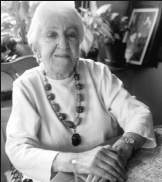By Lincoln Anderson
Henrietta Yurchenco, a renowned ethnomusicologist who played an influential role in the New York folk music scene, died Dec. 10 after a short illness. She was 90.
Henrietta Weiss Yurchenco, the daughter of Rebecca and Edward Weiss, Russian immigrants, was born March 22, 1916, in New Haven, Conn. Her father was “a dreamer who started out in business and failed miserably,” Yurchenco recalled in a 2003 interview with The Villager’s Jerry Tallmer at her Chelsea apartment.
A key figure in the New York folk music movement, she introduced Pete Seeger, Woody Guthrie and Lead Belly on New York radio. She hosted the WNYC radio show “Adventures in Folk Music” from 1960-’69. She conducted one of the first broadcast interviews of Bob Dylan in April 1962. And she later defended his electrification of folk music in an article “Folk-Rot: In Defense.”
Prior to broadcasting, Yurchenco did extensive recording of indigenous music among remote tribes in their native languages in Mexico and Guatemala and later in Spain, Puerto Rico, the Balearic Islands, Colombia, Ecuador, John’s Island, S.C., and Ireland and among Sephardic Jewish communities in Morocco right before the start of their migration to the new state of Israel.
Yurchenco said some of Morocco’s Sephardic Jews were still singing versions of Spanish songs from 500 years ago from the time of the Jews’ expulsion from Spain.
“Women have preserved these songs over the centuries, and I wondered why, because these are bloody songs, full of rape and murder — but also of great stories,” she said in The Villager profile. “I mean, how many times can you sing about Cinderella?”
In Mexico, she is widely known as “Henriettissima,” and recently was honored with the naming of a library, the Fonoteca Henrietta Yurchenco. Her original recordings are housed at the U.S. Library of Congress, and have been released on CD by Nonesuch and Folkways/Smithsonian records.
Yurchenco was also a fixture in the 1940s artistic community in New York, participating in social circles that included Frida Kahlo, Burl Ives, Alan Lomax, Margaret Mead and others. She was known for the parties she threw at her St. Mark’s Pl. apartment, at one of which The Weavers wrote “Kisses Sweeter Than Wine” in the bathroom.
She attended Yale School of Music, and in 1936 married the Argentine-born painter Basil Yurchenco. They had a son, Peter. Her second marriage was to architect Irving Levine, though it was not a happy marriage.
She also taught world and folk music at CUNY – City College for 25 years and held the title of professor emerita.
In 2003, she published her memoirs, “Around the World in 80 Years.” Her other books include “A Mighty Hard Road,” on the life of Woody Guthrie, “A Russian Song Book” and “Hablamos!” as well as numerous articles on folk music and figures, including Dylan, Bessie Smith and Aunt Molly Jackson. She leaves a yet-to-be-published book, “In Their Own Voices,” about the music of Sephardic Jewish women in Morocco.
Yurchenco was interviewed by Mickey Hart of the Grateful Dead and is featured in his book “Songcatcher” published by National Geographic.
She is survived by her son Peter Yurchenco and daughter-in-law Ingrid Yurchenco, of Princeton, N.J., grandchildren Nicholas and Helen, and sister Ruth Lester.



































